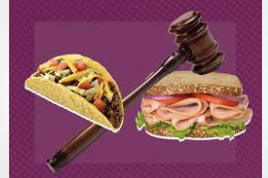Who cares about climate change and other pressing matters when there’s importnat issues like this to be decided!
ATL reports and say…. … Scalia And Posner Had This Fight Years Ago
They go into it in great detail!
This week, Indiana further solidified its status as a haven for Mexican food connoisseurs with a court ruling that “tacos and burritos are Mexican-style sandwiches.”
But while Gaffiganism might easily conclude that a bread-like product encasing cheese, meat, and/or vegetables amounts to a sandwich, how would a more established flavor of interpretation get there?
Previously, the commission denied a Famous Taco from being located in the strip mall partially based on a “written commitment” Quintana accepted with a nearby neighborhood association limiting any restaurant there to one that did not offer alcohol, did not allow outdoor seating and only sold “made-to-order or subway style sandwiches.”
The idea behind the agreement, according to court documents, was to keep national fast-food burger and chicken chains out of the strip mall.
“The Court agrees with Quintana that tacos and burritos are Mexican-style sandwiches, and the original Written Commitment does not restrict potential restaurants to only American cuisine-style sandwiches,” Bobay wrote Monday in the civil case.
Despite the heat this opinion has taken from social media, this seems… correct? To the extent the contract reflected a meeting of the minds, the minds did not seem to care how the meat was minded, as long as the storefront never became a McDonald’s. The clause apparently intended to prevent mass assembled hamburger sandwiches and only reads this way to allow a Subway, not to restrict leasing the spot only to its sandwich artists. And, before anyone tries to argue that a hamburger isn’t a sandwich, it’s literally the result of putting a “Hamburg style steak” — the term for a ground beef steak used in the 1800s — between bread. There’s your dash of originalism.
What’s more, this fact pattern has come up before! Legal legend Judge Richard Posner wrote a brilliant review of Reading Law, an attempt by Justice Scalia and Bryan Garner to explain how dictionary definitions should dominate judicial interpretation. In any event, the Scalia book cited a Massachusetts case that denied a Mexican restaurant lease on the grounds that tacos aren’t sandwiches. Scalia and Garner praised that court for adhering to Merriam-Webster’s definition of a sandwich as “two thin pieces of bread, usually buttered, with a thin layer (as of meat, cheese, or savory mixture) spread between them.” But the court didn’t stick with the dictionary definition. As Posner notes, the court spent a good deal of time focusing on the fact that the clause was drafted by the party ultimately arguing for the expansive definition, meaning that they could’ve just as easily not included this language if they weren’t trying to hide the ball.
Those are more persuasive points than the dictionary’s definition, and as is often the case, the court got the definition wrong. (Scalia and Garner miss this, too.) A sandwich does not have to have two slices of bread; it can have more than two (a club sandwich) and it can have just one (an open-faced sandwich). The slices of bread do not have to be thin, and the layer between them does not have to be thin either. The slices do not have to be slices of bread: a hamburger is regarded as a sandwich, and also a hot dog—and some people regard tacos and burritos as sandwiches, and a quesadilla is even more sandwich-like. Dictionaries are mazes in which judges are soon lost. A dictionary-centered textualism is hopeless.
And, as the judge notes in the Indiana case, taking such a limited view of sandwiches would also reinforce culturally exclusive baggage if “made-to-order Greek gyros, Indian naan wraps, or Vietnamese Banh mi” get excluded based on a static definition that makes the Earl of Sandwich the sole arbiter of meaning.
All this is to say that textualism, originalism, or “textual originalism,” as Posner identified Scalia’s incoherent hodge-podge of a theory, can’t adjudicate better than an honest analysis of the meaning of words in context. The Indiana case, as found by this judge, intended the sandwich exclusivity clause in a particular way that should not limit other made-to-order “bread, cheese, meat, vegetable” products. The Massachusetts case had a different posture. A reasonable judge can navigate those distinctions without resorting the parlor trick of digging up some 19th century diary entry that reads “I don’t know, Sam… it just doesn’t seem like a ‘sandwich’ if it doesn’t use brea—arrrgh!” (Crockett, David (Davy), March 6, 1836, San Antonio).
Read more




